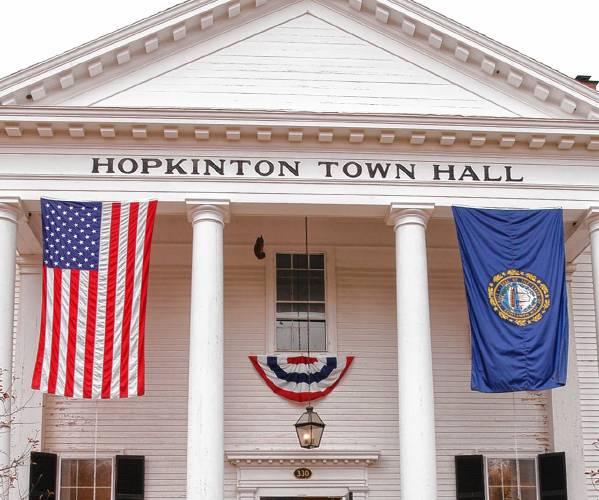Hopkinton pushes for SB2 in school elections

Voters stream in and out of Hopkinton Town Hall in Hopkinton, N.H. Tuesday, Nov. 2, 2004. (AP Photo/Lee Marriner) LEE MARRINER
| Published: 02-26-2024 8:00 AM |
Loren Clement wants every resident in Hopkinton, regardless of their age, health or work schedule, to have an equal opportunity to participate in town and school annual meetings.
He firmly believes the town and school should move away from the traditional form of meetings, where residents deliberate and vote at one meeting in March in favor of transitioning to a split form of self-government where residents deliberate at one meeting and vote on issues at the ballot box.
“I feel that our current voting system suppresses some voters that are not able to make it to both our school and town meetings,” Clement said at the school district hearing to consider a move to SB2. “I think that ballot vote is the ideal way. It is the fairest way to do this.”
Both school and town meetings in Hopkinton follow the traditional town meeting format, where interested voters come together to discuss and debate budgets, warrant articles and other issues. Traditional town meetings allow for open-floor debates and elected officials to explain each dollar amount they are asking from taxpayers. Unless a secret ballot vote is specifically requested, votes are typically cast by a show of hands or voice.
Privacy while voting is another reason Clement cited in his plea to transition to the SB2 form of elections: “When filming in a public setting, or voting amongst your peers and someone that can influence the way someone votes whether someone simply has social anxiety in a gym full of people have a fear of being around other people.”
SB2 meetings, also known as the Official Ballot Referendum form of town meeting, include a deliberative session, similar to a traditional town meeting, when voters discuss the budget and warrant articles and can make amendments. Opponents of SB2 say a small motivated group of voters can wield outsized power at deliberative sessions and can make drastic amendments, like gutting the budget. On voting day, no changes can be made to the ballot.
Sometimes, traditional town meetings can go on for hours, with every resident having an opportunity to comment on every warrant article. For residents like Joyce and Richard Bennett, it can be tedious, especially if you don’t have enough time to carve out of your everyday life or your body can’t handle it.
The Bennetts have lived in Hopkinton for 33 years and have attended meetings that lasted more than six hours. While Joyce could endure such marathons in her youth, she can’t anymore.
Article continues after...
Yesterday's Most Read Articles
 Webster seized and sold his house for back taxes. Now the town has agreed to pay him $38,000
Webster seized and sold his house for back taxes. Now the town has agreed to pay him $38,000
 A Webster property was sold for unpaid taxes in 2021. Now, the former owner wants his money back
A Webster property was sold for unpaid taxes in 2021. Now, the former owner wants his money back
 ‘The rug pulled out from under me’: For certain police and firefighters, last-minute changes to retirement deal breeds distrust
‘The rug pulled out from under me’: For certain police and firefighters, last-minute changes to retirement deal breeds distrust
 Universal EFA program sees 2,000 applications in first week of expansion
Universal EFA program sees 2,000 applications in first week of expansion
 Hillclimbs, nightlife and cruising: Enthusiasts flock to 102nd Laconia Motorcycle Week
Hillclimbs, nightlife and cruising: Enthusiasts flock to 102nd Laconia Motorcycle Week
“We were a lot younger and free to sit there for six hours but now, 33 years later, with arthritis and all kinds of stuff, it’s just not possible for people our age to sit there and partake for that amount of time,” she said.
Sarah Mattson raised doubts about SB2’s effectiveness in controlling government spending. She said a default budget is not always lower than the proposed budget.
“I just want to say if you think SB 2 is going to limit future spending, that may just not be what the Hopkinton electorate looks like. The process that we have now, where people have to work things out and in the setting of a meeting, may be a more effective tool for controlling,” said Mattson.
While the majority of individuals at Tuesday’s SB public hearing supported the school district to transition to an SB2 form of government, the school board voted 5-0 against it.
“I don’t see our current system as being fundamentally broken,” said school board member Jim O’Brien, while acknowledging the concerns about voter turnout at the annual meetings. “I’m not sure that’s a reason to change the fundamental way we govern our school district. I think, instead, we should find more ways to encourage more participation.”
The petitioned warrant article to transition to the SB2 form of government will be on the ballot for residents to consider at the school district meeting in March.







 Concord’s two Rite Aid stores shutting soon
Concord’s two Rite Aid stores shutting soon From morning jokes to parental influence: Bow High Class of 2025 graduates
From morning jokes to parental influence: Bow High Class of 2025 graduates
